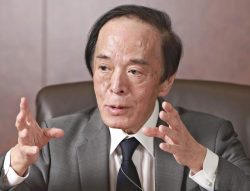Group Sharing Reality of Dementia Celebrates 10th Anniversary; Members Look Back on History, Achievements

Kazuko Fujita, left, and Mamoru Toue, center, express their gratitude to an attendee of an event celebrating the 10th anniversary of the Japan Dementia Working Group on Oct. 23 in Suginami Ward, Tokyo.
2:00 JST, November 13, 2024
This October marked the 10th anniversary of the establishment of the Japan Dementia Working Group (JDWG), a collective made up of people with dementia and their allies.
Aiming to build a society where people with dementia can live with hope and dignity, the group speaks for them with the central and local governments, who increasingly incorporate their thoughts into policymaking. While it was once believed dementia creates challenges for cognition, memory and comprehension, this perception is now shifting.
“Dementia is not something to be ashamed of. I don’t need to hide it. I felt like a weight has been lifted off my shoulders after talking with my peers in the same situation.”
“I can live with peace of mind because people in my neighborhood treat me the same.”
These were comments from JDWG members at an event celebrating the group’s 10th anniversary, held in Tokyo on Oct. 23. More than 40 people with dementia and about 410 others, including their families, were in attendance either online or in person. Eight people with dementia spoke, looking back on the group’s history.
Among them was Tomofumi Tanno, 50, who was diagnosed with early-onset dementia 11 years ago and has since given lectures across the country. At first, most who attended were healthcare and welfare workers, according to Tanno. “Now, many people with dementia and their families come to listen to my lectures. Some people even contact me on social media as soon as they are diagnosed with dementia. Society has changed,” he said.
Kazuko Fujita, 63, representative director, was among those who first set up the group in October 2014. “People with dementia have been trying to live positively, which has helped eliminate the old image of the disease,” she recalled.
She was working as a nurse and raising three daughters in Tottori Prefecture when she was diagnosed with early-onset Alzheimer’s, at 45 years old. She would forget what she had eaten for breakfast, or go into her daughter’s room to wake her up after already having seen her off. Fujita quit her job, fearing causing problems in the workplace.
As she tried to research dementia, she only found negative information, such as that patients becoming unable to understand anything. She felt most people talked about the disease from the perspective of caregivers, like how they should handle people with dementia and what measures they should take to support them.
In reality, it’s not that she can’t do anything, or that she can’t do certain things all the time. “The diagnosis did not change me at all. I want to change society by sharing how I feel as a person with dementia,” she said, recalling how she felt. Together with her friends she started spreading awareness, marking the start of the group’s activities.
The JDWG has consistently advocated for all measures centering the voices of people with dementia. Having met with Diet members many times, they call for the involvement of people with dementia in building communities where they can live with hope.
In 2023, the basic law on dementia was established as lawmaker-initiated legislation. Based on the law, three people with dementia, including Fujita, became members of a committee tasked with discussing measures to be taken by the central government. They reported their activities to the committee, such as study meetings and interactions between people with dementia, and passed on their requests.
Their positive attitudes and activities helped expand the group’s network.
Group member Mamoru Toue in Oita Prefecture, 64, was working as a civil servant when he was diagnosed with early-onset dementia eight years ago. Becoming depressed, he withdrew into his home for about a year.
His perspective shifted after meeting others of the same generation with dementia at a daycare facility, and began playing softball and doing farmwork with them. He traveled to various parts of the country delivering lectures, where he became acquainted with Fujita and the others. The encounters really inspired him. “Now I know there are many people with dementia capable of doing various things, which is encouraging for me,” he said.
Now, about 200 people with dementia participate in the group.
Fujita feels that she cannot do as much as she used to, such as taking notes at meetings or organizing ideas by listening to others. However, now she has more friends working alongside her. “I want to make more friends both with people with dementia and those who could possibly develop it in the future. And I want to create a better community with them,” she said.
Reflected in policies, products
The turning point for shifting the image of people with dementia came after the International Conference of Alzheimer’s Disease International, held in Kyoto in 2004.
The late Shunji Ochi, from Fukuoka Prefecture, spoke about his experience with dementia in Japan, using his real name. In the same year, the government reviewed the term “chiho,” which had been used to express dementia in Japan, and identified the term as problematic due to its derogatory connotations. The term for dementia was revised to “ninchi-sho,” meaning “cognitive disorder.”
The government’s policy implementation plan places importance on the perspectives of people with dementia and seeks to encourage them to share their feelings and views. In fact, more and more municipalities are organizing meetings for people with dementia to interact with each other, and peer support activities to advise those recently diagnosed. Some municipalities gather their feedback and reflect them in policies.
In the private sector, some companies seek user feedback from people with dementia on their products. Examples include stove burners with brightly colored switches and reversible clothes, which are now available on the market.
Top Articles in Society
-

Producer Behind Pop Group XG Arrested for Cocaine Possession
-

Man Infected with Measles Reportedly Dined at Restaurant in Tokyo Station
-

Man Infected with Measles May Have Come in Contact with Many People in Tokyo, Went to Store, Restaurant Around When Symptoms Emerged
-

Woman with Measles Visited Hospital in Tokyo Multiple Times Before Being Diagnosed with Disease
-

Australian Woman Dies After Mishap on Ski Lift in Nagano Prefecture
JN ACCESS RANKING
-

Producer Behind Pop Group XG Arrested for Cocaine Possession
-

Japan PM Takaichi’s Cabinet Resigns en Masse
-

Man Infected with Measles Reportedly Dined at Restaurant in Tokyo Station
-

Israeli Ambassador to Japan Speaks about Japan’s Role in the Reconstruction of Gaza
-

Videos Plagiarized, Reposted with False Subtitles Claiming ‘Ryukyu Belongs to China’; Anti-China False Information Also Posted in Japan























